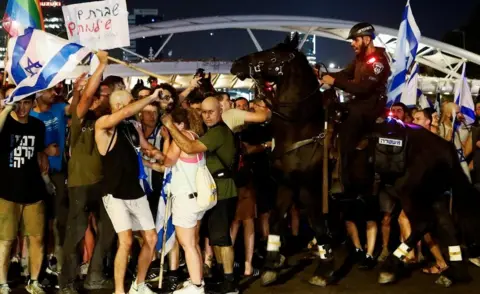Israel judicial reform: Crowds confront police as key law passed
Israeli police clashed with crowds of protesters at night after parliament adopted a highly controversial law to limit the Supreme Court's powers.
The measure - part of a big reform package - will prevent the court from overruling government actions it considers unreasonable.
Police in Jerusalem and Tel Aviv used water cannon to disperse protesters blocking highways.
Critics say the hard-right government's reforms threaten Israeli democracy.
After months of mass street protests over the judicial reform Monday's Knesset (parliament) vote was an important victory for Prime Minister Benjamin Netanyahu.
But the battle is not over. It may go on for months.
A political watchdog group and centrist opposition leader Yair Lapid plan to petition the Supreme Court to annul the new law.
Moreover, Israel's Histadrut trade union confederation has threatened a general strike and thousands of military reservists, including air force pilots, have vowed to not report for duty if the law is allowed to stand.
For a country that prides itself on its ability to respond fast to any kind of threat, the fact that Israel's very security might be compromised is causing real anxiety.
Mr Netanyahu has insisted the law is necessary for the government to "carry out policy in line with the decision of the majority of the citizens of the country".
But he said he was willing to resume talks with the opposition, even until November, to find an all-inclusive agreement.
The planned reforms have triggered some of the biggest protests in Israel's history. On Monday at least 22 people were arrested, police said.
Opponents fear the changes could undermine the country's democratic system, tipping it into authoritarian territory.
They worry that nationalist and ultra-Orthodox religious parties allied to Mr Netanyahu will be able to shape policy with unchecked power.
But the government argues that the reforms are necessary to correct an imbalance in power which has seen the courts increasingly intervene in political decisions.
The so-called "reasonableness" bill was approved by 64 votes to 0, after the opposition boycotted the final vote.
 Reuters
ReutersThe White House - a key ally of Israel - called it "unfortunate" that the law had been passed.
The vote brings to a head months of turmoil, with Israel's president warning political leaders on Monday that the country was "in a state of national emergency".
The street protests outside the Knesset lasted all of Monday, amid a cacophony of noise from drums, whistles and air horns.
A demonstrator lying in the street told the BBC he was defying "dictatorship", adding that his grandfather had been a wartime codebreaker against the Nazis at the UK's famous Bletchley Park.
Asked how long he would stay put he said: "We will never surrender".
Another, Reut Yifat Uziel, the daughter of a paratrooper pictured in an iconic Israeli photograph of the capture of the Western Wall in the 1967 Middle East war, said she feared for her children's future.
"Netanyahu kidnapped the country and I am worried it will become a theocracy," she said.

The protesters - tens of thousands of whom marched some 45 miles (70km) from Tel Aviv to Jerusalem at the end of last week - set up camp in a park between the Knesset and the Supreme Court, which are located almost next to each other.
Mr Netanyahu was in parliament for the vote hours after being discharged from hospital following unscheduled surgery for a pacemaker on Saturday.
The controversial reforms have polarised Israel, triggering one of the most serious domestic crises in the country's history.
Hundreds of thousands of demonstrators have taken to the streets weekly since the start of the year in protest at what they say is an attack on democracy.
Former heads of Israel's security services, chief justices, and prominent legal and business figures have also been vocal against the government's reforms.
The measures have also been criticised by the US President Joe Biden, who in his most explicit comments yet called for the "divisive" reforms to be postponed.
